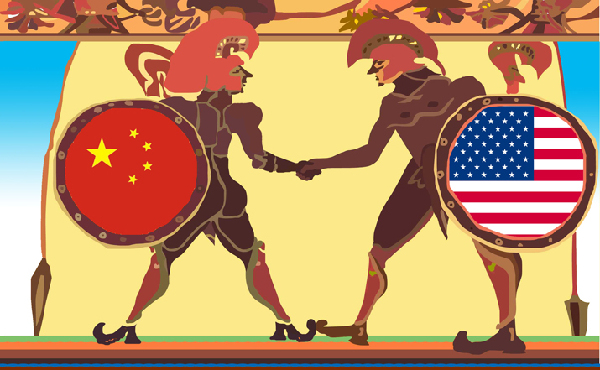Why China and the US can avoid the Thucydides' trap
- By Li Zhihui
 0 Comment(s)
0 Comment(s) Print
Print E-mail Beijing Review, October 12, 2015
E-mail Beijing Review, October 12, 2015
|
|
|
[By Li Shigong/Beijing Review] |
Editor's Note:
During his recent state visit to the United States, President Xi Jinping dismissed fears that China and the United States might fall into the "Thucydides' trap," a theory that claims China's rapid rise would prompt it to challenge the leadership of the United States and the two may resort to war. In an editorial published by Xinhua News Agency in late September, Xinhua writer Li Zhihui cited 10 reasons why the two major powers can avoid the trap. Excerpts of the piece follow:The Thucydides' trap warns of the danger when a rising power comes into conflict with a ruling one--as Athens and Sparta did in the fifth century B.C. The majority of such conflicts have ended in war.
While the 2,500-year-old concept is worth studying, applying it to China-U.S. relations, as some commentators have done, is like modern doctors basing their medical practices on the writings of Erasistratus (304-250 B.C.), a well-known Greek physician.
As Chinese President Xi Jinping said during his visit to the United States, there is no such thing as the so-called Thucydides' trap in modern times. But should major countries time and again make the mistake of strategically misunderstanding each another, they may very well create such traps for themselves.
The world today is very different from the time of ancient Greece, and mankind has more wisdom at its disposal to avoid history repeating itself. We have reason to believe that China and the United States face an unprecedented opportunity to break the historical cycle.
Century of peace
This is a world where peace, development, cooperation and mutual benefit have become the dominant themes of political discourse in our times. The Cold War mentality and zero-sum-game theory should be abandoned.
Despite the persistence of regional conflict, there is no sign of another world war breaking out. More and more countries are choosing to solve their disputes through negotiation.
With globalization deepening, one country's loss will definitely not just be its own. "No conflict, no confrontation" will serve as the bottom line for the relationship between the world's two largest economies in the new era.
Historical lessons
It is important to remember the pledge made 70 years ago by the founders of the UN: "to save succeeding generations from the scourge of war, which twice in our lifetime has brought untold sorrow to mankind."
Governments and societies of both countries have reflected on the historical lessons on the 100th anniversary of World War I and the 70th anniversary of the end of World War II (WWII). Hatred and war can bring only disaster and distress, especially when both China and the United States have nuclear weapons.
If war erupts, China's development would surely suffer a severe blow, but the United States' leading role in the world would also be weakened. As allies during WWII, the two countries shoulder responsibility to safeguard peace and prevent past tragedies from reoccurring.
China's peaceful rise
"It was the rise of Athens and the fear that this inspired in Sparta that made war inevitable," Thucydides wrote. China, however, is not Athens and the United States is not Sparta.
It is true that China is rising, but it is a peaceful rise. The country wishes only to bid farewell to its humiliating modern history and realize its dream of national renewal through reform and opening up.
As Xi said in his Seattle speech on China-U.S. relations, development remains China's top priority. To people charged with the governance of China, their primary mission is to focus all resources on improving people's living standards and to gradually achieve common prosperity.
China sees itself as a member of a global community of common destiny. It does not seek to establish military alliances or engage in hegemonic expansion. There is no cause for fear as China has neither the intent nor the necessity to challenge the United States for leadership by launching a war.







Go to Forum >>0 Comment(s)